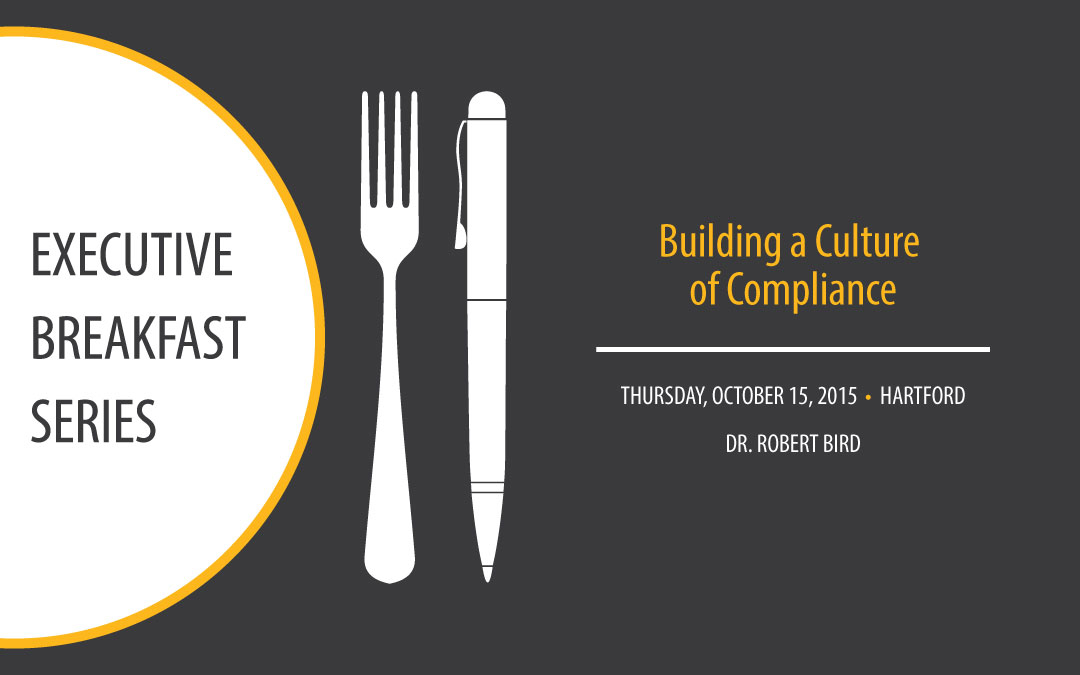‘Building a Culture of Compliance’ Continues Executive Education Breakfast Series
The Chief Operating Officer of a nuclear utility in Washington state noticed an employee trip on the stairs after catching her heel on some loose carpeting. The executive, laden with a full schedule of meetings and decisions, “stood guard” in the stairway until a repair person could arrive, ensuring that no one else got hurt.
That is one example of what a ‘culture of compliance’ looks like, where everyone, including key executives, takes individual responsibility for the values of the organization, said Robert Bird, a UConn professor of business law and the keynote speaker at an upcoming UConn School of Business Executive Education breakfast program titled, “Building a Culture of Compliance.”
The complimentary program is at 8 a.m. Oct. 15 at the UConn Graduate Business Learning Center, 100 Constitution Plaza, Hartford, and includes a hot breakfast buffet and networking from 7:30 to 8 a.m. The program will appeal to anyone who considers himself or herself a compliance game-changer, Bird said.
Compliance regulations cost American companies billions of dollars annually, said Bird, who is the Eversource Energy Chair in Business Ethics at the university. There are more laws, higher standards and stricter penalties for non-compliance than ever before. Meanwhile, companies are on a “hiring spree” and battling each other to recruit talent in the compliance field.
“One of the key aspects of compliance is setting a tone of integrity,” he said. “Integrity means acting according to the values of your firm, without having to be prompted. It is about following the letter and the spirit of the rules, both internal and external.
“Integrity is about honesty, reliability, trustworthiness and candor,” he said. “For top managers, it involves building an ethical infrastructure and strong norms. I think this program will appeal to anyone who wants to transform a company, to really change its culture.”
“The tone is set at the top,” he said. “If managers don’t embody the values they promote, the employees will very quickly notice. CEOs and other executives have to be willing to follow their corporate values, even when it means sacrificing a reward or a raise. No company wants to have ‘fair-weather values.’ They need to be enduring.”
Compliance is a two-pronged approach, he said. First the company must exercise due diligence to prevent and detect criminal conduct. Secondly, it must promote a culture that encourages ethical conduct and a commitment to comply with the law. Conformance to guidelines can mitigate up to 95 percent of potential fines, he said.
“Embedding principles and aspirations establishes a values-driven organization,” he said. Every employee—from the newest to the most senior—should be on board.
He will also discuss how compliance is about more than following rules, but also making risk-wise, cost-sensitive decisions that keep enterprise within legal boundaries. He will highlight the critical drivers of compliance success, including engagement with regulators, changing employee attitudes, building a culture of integrity and the importance of ethics. Bird will talk about why expensive corporate compliance programs often fail, and what makes a successful compliance-focused organization.
Lastly, Bird will help managers identify where their organizations are on the compliance scale simply by listening to important evidence that employees share.
Bird is a highly regarded and highly awarded researcher, who specializes in employment law, legal strategy, intellectual property law and business and human rights. He has authored more than 70 academic publications, including articles in the Journal of Law and Economics, the American Business Law Journal, the Connecticut Law Review and the Harvard Journal of Law and Public Policy. He earned his law degree from Boston University in 1996.
The fall breakfast series kicked-off Oct. 7 at UConn Stamford with “Demystifying Big Data,” presented by Ramesh Shankar, professor and assistant department head for UConn’s operations & information management programs.
Big Data impacts businesses in ways both big and small, from credit scores to customer information, said Shankar. For instance, if a business is planning to borrow money, lenders like Credit Junction and Kabbage are using data analytics from multiple sources to investigate a company’s sales and expenses, cash flow problems and more, said Shankar.
“We can store, manage and analyze data like never before,” said Shankar. “And the result is yielding better results for customers—and helpful information for businesses.”
The breakfast series will conclude with “Social Networks in Organizations,” presented by Travis Grosser, professor of management, at 8 a.m. on Nov. 5 at the UConn Graduate Business Learning Center.
Social networks that exist within a firm are crucial to its operation as they are the means by which critical knowledge and resource are conveyed. The emerging field of social network analysis offers tools and concepts that can help leaders better understand the networks that exist in their organizations. Grosser, a professor of management, will discuss how they impact employee satisfaction, performance, innovation and creativity, as well as knowledge sharing.
To register or for more information on these events, contact Amanda Spada at (860) 486-5498 or at Amanda.Spada@business.uconn.edu.
The University of Connecticut School of Business’ Executive Breakfast Series offers innovative and thought-provoking discussions about business issues in our region and are offered by academic experts. These complimentary presentations are part of the School’s commitment to enhance the competitive advantage of Connecticut’s professional community in the business environment.
